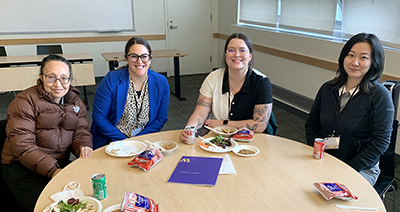Resources

Neuroscience for Neurodiverse Learners (NNL) compiles and creates resources for science, technology, engineering, and mathematics (STEM) educators working with neurodiverse students.
Community of Practice
NNL project staff and faculty leaders engage in an online Community of Practice (CoP) that includes key stakeholder groups that impact efforts to make neuroscience activities accessible for everyone (e.g., faculty, students, disability service units, informal science learning programs, teaching and learning centers, diversity programs, professional organizations). CoP participants share ideas and assist in the creation and dissemination of resources to encourage others to help a broader range of students and patrons learn about universal design and accessibility in neuroscience educational settings.
CoP members take part in the following:
- Identify and share ways to better serve neurodiverse students in classroom settings.
- Offer strategies for recruiting a wide variety of stakeholders to participate in project activities.
- Share disability-related and universal design content to be incorporated into classes.
- Learn about NNL events, training videos, resources, and publications.
- Identify unmet needs and useful products for the project to develop.
- Provide input for a project video and related online resources.
- Suggest future project activities.
Individuals can join the STEM Educators Community of Practice by contacting doit@uw.edu.
Knowledge Base
The NNL Knowledge Base currently contains over 650 Case Studies, Promising Practices, and Q&As regarding the accessibility of technology, college, graduate school, and careers for individuals with disabilities. Many articles focus on serving neurodiverse students effectively. Example articles include the following.
Promising Practices
- Across Campus and Beyond: A Promising Practice to Increase Conversations about Neurodiversity in the Engineering Classroom
- The Neurodiversity Initiative: A Promising Practice for Promoting Disability Awareness in Higher Education
Q&As
- Are there employment resources specifically designed to serve neurodivergent job seekers?
- What do “neurodiverse” and “neurodivergent” mean?
Case Studies
- Collaboration Struggles in an Engineering Lab: A Case Study About a Student with Autism
- Inaccessibility in a Calculus Course: A Case Study on Educating Faculty and Staff about Learning Disabilities
- Kim and Biology: A Case Study on Accommodations for Learning Disabilities
- Jan and Large Lectures: A Case Study on Accommodations for Psychiatric Disorders
Other Web Resources
Find informational briefs and videos on the NNL website.
- STEM and Neurodiversity: A Capacity Building Institute for Faculty at Community and Technical Colleges (2022)
Summaries and video presentations from the 2022 NNL CBI. - Equal Access: Universal Design of Neuroscience Education and Research
Learn how to create neuroscience facilities and resources accessible to people with disabilities. - Promising Practices That Engage People with Disabilities in the CNT
A series of strategies for including people with disabilities in other engineering research centers. - Checklist for Making Engineering Labs Accessible to Students with Disabilities
Designing engineering labs so that all students can fully participate. - Equal Access: Universal Design of Engineering Departments
Guidelines on creating an accessible engineering department using universal design. - Equal Access: Universal Design of Your Engineering Research Center (ERC)
A checklist for making ERCs welcoming, accessible, and usable. - Equal Access: Universal Design of Your Project
A checklist for making projects welcoming, accessible, and usable
Campus Resources
Many post-secondary campuses will house organizations and groups that are supportive of students with disabilities, including neurodiverse learners. Examples at the University of Washington campus include the following.
- Huskies for Neurodiversity: Huskies for Neurodiversity is a student-led initiative that promotes visibility and acceptance of neurodiversity at the UW campus and beyond through articles, lived experience interviews with neurodivergent people, interactive website, and panel events. Their goal is to destigmatize and educate about neurodiversity and disability accommodations on campus to students and faculty, as well as provide a platform for neurodivergent individuals to share their stories and experiences in their own voice.
- Associated Students of the University of Washington Student Disability Commission: The Commission was established to create communities for individuals with disabilities and their allies by providing programming, resources, and a safe accessible space.
- UW Disability and D/deaf Culture Center: The UW Disability and d/Deaf Culture Center fosters a climate of social justice and pride, centered on universal design, access, and diversity. It cultivates disability and d/Deaf pride by promoting social justice through an inclusive environment, sharing resources for self-advocacy, developing educational programming, engaging stakeholders with principles of universal design, and promoting a transforming socio-cultural understanding of disability.
- Mad Campus: Mad Campus is a peer group for students identifying with or experiencing madness, mental illness, and/or neurodiversity. Mad Campus meets throughout the school year on a semi-weekly basis.
- Disability Studies Program: Disability studies at the UW involves a multi-campus interdisciplinary group of faculty, staff, students, and community members, who share an interest in questions relating to society’s understanding of disability. The undergraduate disability studies minor and the individualized studies major in disability studies provide opportunities for students to develop a strong interdisciplinary foundation in the social, legal, and political framing of disability.
- Disabilities, Opportunities, Internetworking, and Technology (DO-IT): The DO-IT (Disabilities, Opportunities, Internetworking, and Technology) Center is dedicated to empowering people with disabilities through technology and education. It promotes awareness and accessibility—in both the classroom and the workplace—to maximize the potential of individuals with disabilities and make our communities more vibrant, diverse, and inclusive.